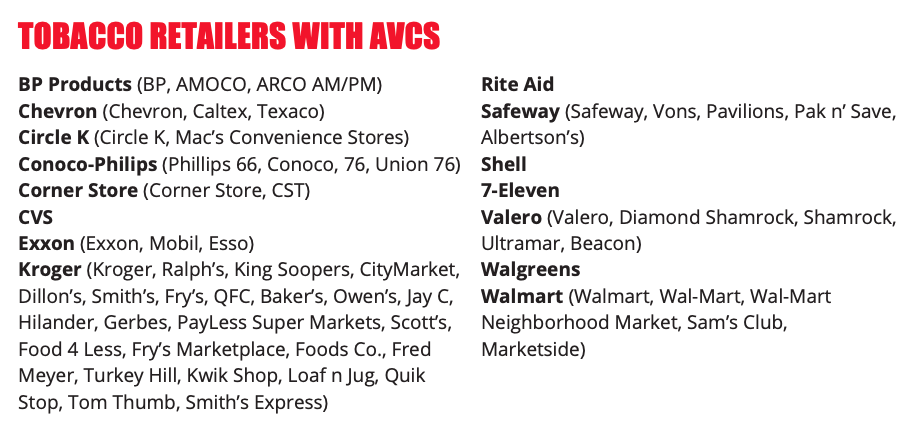Assurances of Voluntary Compliance
Background
A tobacco-related Assurance of Voluntary Compliance (AVC) is a legally binding and enforceable agreement between a company (a tobacco retailer) and one or more states (under each state attorneys general) in which the retailer agrees to adhere to certain standards and practices to reflect their commitment to the responsible marketing of tobacco products. Common examples of these standards and practices include limiting the type and location of tobacco advertising permitted, prohibiting the sale of look-a-like products, and prohibiting self-service tobacco displays. These provisions are designed to prevent the sale of tobacco to minors and to reduce the appeal of tobacco products and tobacco product advertising that are targeted to youth. The current tobacco-related AVCs were negotiated as a way to resolve investigations into the companies for alleged violations of consumer protection laws (e.g. too many repeated sales to underage youth).
Point-of-sale policy strategies can combat tobacco industry targeting. Unfortunately, the tobacco industry works hard—and spends lots of money—to thwart efforts to pass those policies. In addition, many jurisdictions are preempted from passing policies stronger than their state’s; and the tobacco industry likes it that way. That’s where AVCs come in.
Collecting data about a retailer’s adherence to the standards and practices it agreed to through an AVC is a great way to engage your community and see results quickly. In recent years, cooperation between public health practitioners and Attorneys General Offices has led to “look-a-like” products (e.g. candy cigars, beef jerky “chew”) being removed from shelves and websites, advertising with youth appeal being removed from store displays, and AVC retailing provisions being voluntarily applied to e-cigarette products. In addition, a 2018 study found that AVCs were associated with lower rates of sales to minors and concluded that the adoption and expansion of AVCs may improve youth tobacco prevention efforts.[1]
Download Resources & Materials
- AVC snapshots: includes the who, what, where, when, and why of each retailer agreement.
- Retailer-by-retailer summary: includes basic provisions and which states are signatories to each agreement.
- Full text of each AVC
- Fact sheet from the Public Health Law Center: Using Retailer AVCs as a Tool in Tobacco Control
Interested in conducting AVC inspections in your community?
- AVC Field Inspection Form
- AVC Field Inspection Form Instructions
- Want to conduct the inspections using a mobile electronic form? Contact Counter Tools!
AVC Success Stories
In this webinar, held in September 2018, Youth Tobacco Attorney and Assistant Attorney General for the Arizona Office of the Attorney General, Erika Mansur (JD), gives an overview of AVCs and Statewide Tobacco Policy Manager at the Bureau of Tobacco Free Florida, Brittany Chatman (MHA, FCCM), discusses Florida’s success in assessing retailers for tobacco-related AVCs across the state. This webinar is part of Counter Tools’ Healthy POS Webinar Series. Download the slides, and view the recording here or below:



